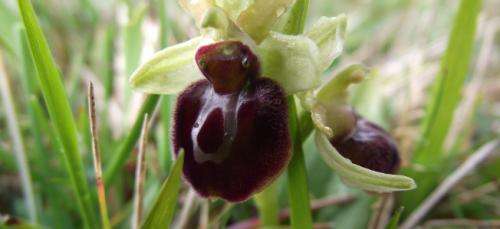Climate change causes bees to fall out of sync with flowering plants

Climate change could be disrupting the relationship between bees and plants according to new research from the University of East Anglia (UEA).
A study published today reveals that warmer springs cause changes in the life cycle of bees – throwing them out of synchronisation with the plants they pollinate.
The research is the first clear example of the potential for climate change to disrupt critical co-evolutionary relationships between species.
Researchers studied long-term trends in historical records dating back to 1848. Records of a solitary bee (Andrena nigroaenea) from museum specimens were compared with the records of flowering time of the Early Spider Orchid (Ophrys sphegodes, pictured) and Met Office climate records.
They found that warmer springs cause orchids to flower earlier. But this does not correspond exactly with the earlier flying of the bees.
The study shows that male bees fly around nine days earlier for each degree increase in average early spring temperature. Meanwhile female bees emerge slightly later than males, near peak orchid pollination time.
Researcher Dr Karen Robbirt from UEA's School of Biological Sciences said: "These orchids have evolved so that when Spring comes, their flowers appear at the same time as this specific bee - making pollination possible. But we have shown that plants and their pollinators show different responses to climate change, and that warming will widen the timeline between bees and flowers emerging. If replicated in less specific systems, this could have severe implications for crop productivity."
Lead researcher Prof Anthony Davy from UEA's School of Biological Sciences said: "Under normal conditions, male bees are deceived into inadvertently pollinating orchid flowers during what we call 'pseudocopulation'. But this process could be disrupted by climate change.
"Warming by as little as 2°C causes the males to emerge much earlier, meaning they are less well synchronised with the orchids. The problem is compounded by the female bees which are also emerging earlier, and attracting the attention of the male bees. This means that the male bees are more likely to copulate with the female bees, rather than pollinating the orchids.
"There will be progressive disruption of pollination systems with climatic warming, which could lead to the breakdown of coevolved interactions between species because they either respond either to different seasonal cues, or to the same cues at different rates."
'Potential Disruption of Pollination in a Sexually Deceptive Orchid by Climate Change' is published in the journal Current Biology on November 6, 2014.
More information: "Potential Disruption of Pollination in a Sexually Deceptive Orchid by Climatic Change" Current Biology DOI: dx.doi.org/10.1016/j.cub.2014.10.033
Journal information: Current Biology
Provided by University of East Anglia



















